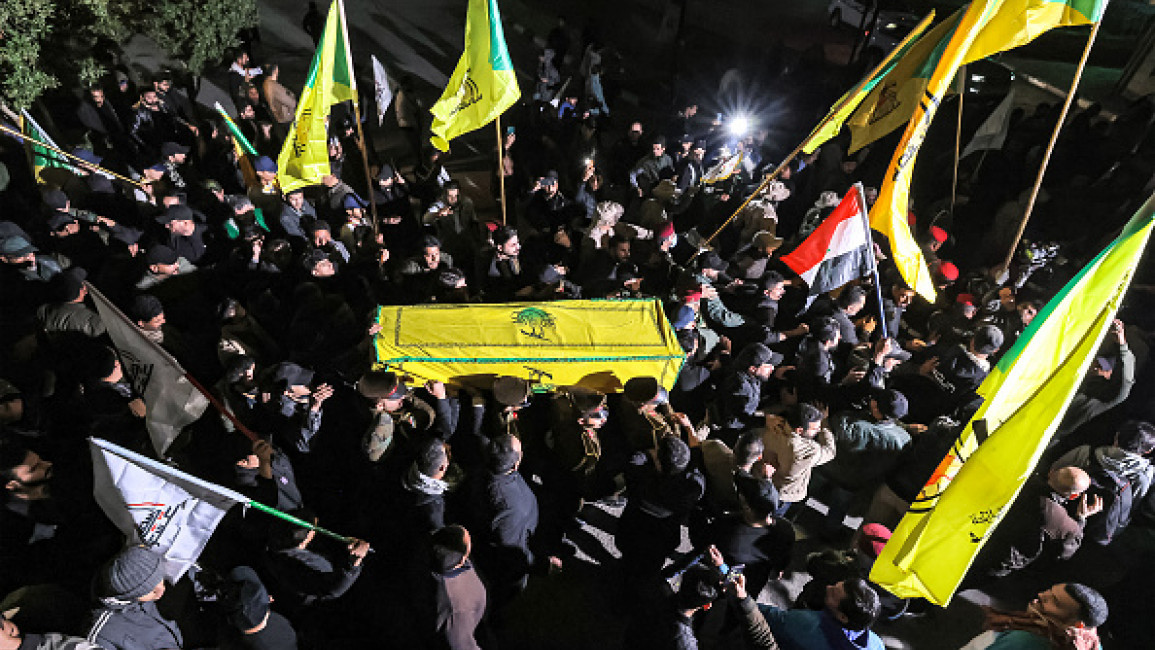Lebanese Hezbollah representative pushes for escalation during secret visit to Baghdad
Sheikh Mohammad Hussein Al-Kawtharani, acting as the main intermediary for the Lebanese armed group Hezbollah in Iraq, has secretly visited Baghdad in the past three days to escalate further and confront the US military presence in the country.
Al-Kawtharani conducted talks with prominent leaders of armed factions and other political figures within the ruling Coordinating Framework alliance, officials in the Iraqi capital, Baghdad, told Al-Araby Al-Jadeed, The New Arab's Arabic sister website.
Kawtharani is known to be the representative of Hezbollah in Iraq during the past few years, with his role becoming more prominent in various political crises between Iraqi forces and other armed factions as he acted as a mediator.
A member of the Iraqi parliament, who requested anonymity, stated that Kawtharani has been in Baghdad since last Thursday, 4 January, and held a series of meetings with key leaders in armed factions allied with Tehran and political leaders in Baghdad. The Iraqi MP mentioned that Kawtharani also held meetings at a location related to the Popular Mobilisation Forces in the Karrada area of Baghdad.
Another political source affirmed to Al-Araby Al-Jadeed that the visit and discussions focused on the escalation of US airstrikes within Iraq and the situation in southern Lebanon. The source noted that this was the definite topic of the talks, but the details exchanged during the meetings remain unknown.
The United States announced a reward of up to ten million dollars at the end of 2020 for any information about the activities, networks, and associates of Hezbollah's leader, Mohammad Kawtharani. He is accused of playing a pivotal role in coordinating between groups loyal to Iran in Iraq.
Washington considers Kawtharani, who has been on the US terrorism list since 2013, as the main facilitator of activities of groups operating outside the control of the Iraqi government, encouraging them to attack foreign diplomatic missions.
Iraq is on the verge of significant and dangerous security developments, especially after the assassination of a senior commander in the Al-Nujaba faction.
"Kawtharani has been making continuous visits to Baghdad, as well as Najaf and Karbala, in recent years, directly intervening in Iraqi affairs, whether political or security-related," the president of the Iraqi Center for Strategic Studies, Ghazi Faisal. "Therefore, his visit at this time and in this context is considered normal amid the dangerous security escalation in the region."
مشاهد من إطلاق المقاومة الاسلامية في العراق لصاروخ الأرقب "كروز مطوّر" بعيد المدى بإتجاه حيفا المحتلة .#كروز_المقاومة_يقصف_حيفا pic.twitter.com/TgVzBWnMa5
— صابرين نيوز - Sabereen news (@sabreenS11) January 7, 2024
"Iran has currently made Iraq a part of the ongoing war in the region, and this could have significant repercussions on the overall domestic situation. The Iraqi government must play a real role in keeping Iraq away from the war zone, where Iraq is undoubtedly the biggest loser, by turning its territory into a battleground for settling scores," he added.
Harakat al-Nujaba and other Iran-aligned militias have conducted a string of attacks on US bases across Iraq since Israel launched a brutal war on Gaza on 7 October.
The Islamic Resistance in Iraq, an alliance of Iran-backed armed groups opposing US support for Israel in the Gaza conflict, have escalated their attacks in recent months. On Sunday, the group claimed responsibility for launching a developed ballistic missile towards Haifa in Israel.
Iraqi militias and political parties aligned with Tehran have also been insisting that the Iraqi government should set out a clear timetable for the withdrawal of all US and coalition troops from Iraq.
Iraqi Prime Minister Mohammed Shia al-Sudani said late last month that his government is working on bringing an end to the presence of soldiers from a US-led coalition in the country.
Mushtaq Taleb al-Saeedi, better known as Abu Taqwa, a senior military commander in the Iran-linked Iraqi militia Harakat Hezbollah al-Nujaba, was assassinated in a US drone strike near Baghdad on Thursday. He was the commander of the 12th Brigade of the Popular Mobilisation Forces (PMF).
The PMF is an Iraqi state-sponsored umbrella organisation composed of some 40 militias that are predominantly Shia-dominated with close links to Iran.
The US has 2,500 troops in Iraq and 900 more in neighbouring Syria, on a mission to advise and assist local forces in fighting IS, who in 2014 seized swathes of territory in both countries.



